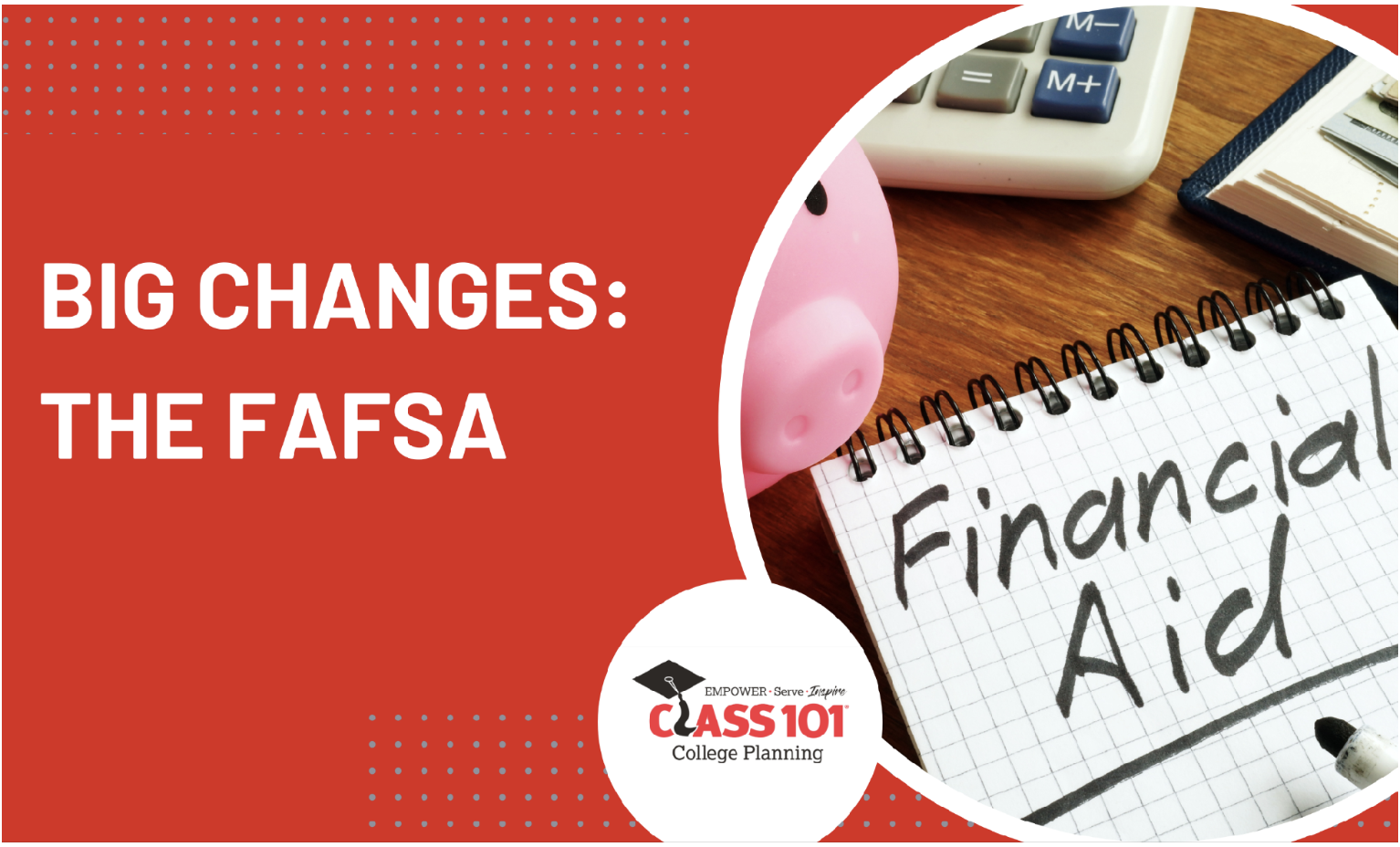October 23, 2023

The FAFSA
The FAFSA stands for the Free Application for Federal Student Aid. This federal form is often intimidating to families who have never completed it because it is the sole form determining government financial aid eligibility for the 17 million or so students in colleges and universities in the United States. The results of the FAFSA have a huge impact on a student’s ability to afford a college degree and can be a determining factor in college selection.
While the FAFSA goes through periodic updates, this year there are quite a few major changes. I’m going to review some of those updates that I think parents and students should be aware of in this blog.
The Basics of the FAFSA
Since 1965, the FAFSA has been critical to U.S. students seeking financial assistance to offset the cost of their higher education. The FAFSA determines eligibility for all federal and state-based financial aid programs such as grants, student loans, and work-study opportunities. The form takes into account a student and their families’ complete financial situation and calculates their Expected Family Contribution, which is used by colleges to determine their financial aid award to the family.
The FAFSA is available the year prior to the upcoming academic year and deadlines can vary depending on the college and the state. Colleges and universities award financial aid until funds run out, so it is important for students to complete the FAFSA early.

Key Changes in This Year’s FAFSA
This year, the FAFSA has made quite a few changes. Unfortunately, families who have gone through the process of completing the FAFSA in prior years will find the process, timeline, and aid calculations different than last year. Fortunately, the changes are being made to simplify the FAFSA and make it more user-friendly.
From our perspective, here are a few of the largest changes in this year’s FAFSA that
families should be aware of.
● Application Opening Date
While the FAFSA typically opens on October 1st, to be completed for the next academic year, this year the timeline has changed. The FAFSA for the 2024- 2025 year is not expected to open until January of 2024.
● Simplification of the FAFSA
The new FAFSA is reducing the number of questions from 108 to about 36.
● Expanded Use of the IRS Data Retrieval Tool
A convenient change is the new FAFSA will allow for the automatic transfer of IRS data to the FAFSA. This reduces the likelihood of verification.
● Formula Shifts
The formulas with this FAFSA increase aid eligibility for single parents and decrease aid eligibility for middle and high-income families. The focus is shifting away from cash flow to a slightly larger emphasis on overall wealth.
● Terminology Changes
There are a couple of name changes to expect with the big one being that the Expected Family Contribution (EFC) will now be called the Student Aid Index (SAI).
● Multiple Children in College
A big shift is that the number of children in colleges at the same time will no longer impact eligibility for need-based financial aid. The parent contribution will not be divided by the number of children in college at the same time. We anticipate this can have a large impact on families with more than one child in college at the same time.
● Which Parent Completes the FAFSA
If parents are divorced, separated, or never married, only one parent completes the FAFSA. Previously, this was the parent where the student lived the most. In the new FAFSA, this will be the parent who provides the most monetary support.

How the New FAFSA Impacts Students and Their Families
Let’s start with the benefits of the new FAFSA. One huge benefit is that the changes make the FAFSA process more user-friendly and straightforward. With fewer questions and the ability to upload data directly from the IRS, we anticipate the process being easier and quicker than ever before.
Like anything that’s new and untested, there are some potential challenges and concerns to be aware of. With new formulas to determine aid eligibility, families may be surprised with the amount of aid they will qualify for compared to past years. A large impact that we’re anticipating this year is a severely reduced time period to complete the FAFSA and for colleges and universities to make offers. With the May 1st National Decision Deadline in place, it will be important for students to understand they will have less time this year to review and understand financial aid offers and make their selections.
Tips for Filing the New FAFSA
While current Seniors cannot start applying for financial aid through the FAFSA until January 2024, they can do a few things to prepare while they wait.
Students and Parents will want to create an FSA ID in order to log in and complete the FAFSA. In our experience, this can sometimes take longer than expected so this is a great first step to take prior to the FAFSA opening. To start, you will need to create an account which requires a social security number and an email address or cell phone number. Once you have your FSA IDs, be sure to save them somewhere safe because you will need them in a few months when the FAFSA opens and then again each year that you complete the FAFSA.
Getting all of the needed information together can arguably be the hardest step in completing the FAFSA. We recommend doing this step now so you are fully prepared and ready to complete the FAFSA in January. Here is what you’ll need:
● Social security number (student and parent)
● Drivers license number
● Alien Registration number if you are not a U.S. citizen
● Federal tax information, tax documents, and tax returns
● Records of any untaxed income
● Information on any money you have including savings and checking account balances, investments, real estate, and business and farm assets
With this year’s FAFSA pushed back by three months, it’s more important than ever to be aware of important deadlines associated with financial aid at your top colleges. Families will have less time to review financial aid offers,
compare offers from all colleges, and communicate with financial aid offices to negotiate offers if needed. A call to your top colleges now can help you make note of important deadlines and timelines that can impact college selection.

Spread the Word
We encourage you to share this blog with friends and family who may need to be made aware of the FAFSA changes. Completing the current FAFSA that is live on the government website will not carry over to the new FAFSA that will be available in January 2024 and we would hate to see anyone waste their time and be disappointed.
Navigate the new FAFSA with the help of Class 101.
We’re here for parents and students when it comes to navigating the complexities of the FAFSA. Our advisors can help you complete the FAFSA and advise on important changes that can impact your family and what you pay for college. To schedule a free consultation, reach out to us at one of our locations:
Class 101 Brandon, FL | Class 101 Carmel, IN | Class 101 Bloomington, IN

March 27, 2025
Not all students aim to apply to highly selective colleges. However, for those who do, our initialrecommendation is to discuss the courses they should take in high school. Having a course selection plan early in their high school career is important, as it gives students time to effectively outline theiracademic path. We believe that course […]
Read More >
March 12, 2025
8-10. That’s the number of college visits we recommend for each Class 101 student. After advising thousands of high school students through the college selection process, we’ve seen many instances where students with a dream school in mind visit that campus, only to realize that college is nothing like they expected it to be. While […]
Read More >
February 21, 2025
With the cost of college rising, one of the biggest ways Class 101 supports families in their college planning process is by helping them understand and work through financial aid offers. We want to stress that while receiving a financial aid package from a private college or university is an important step toward making higher […]
Read More >